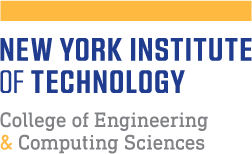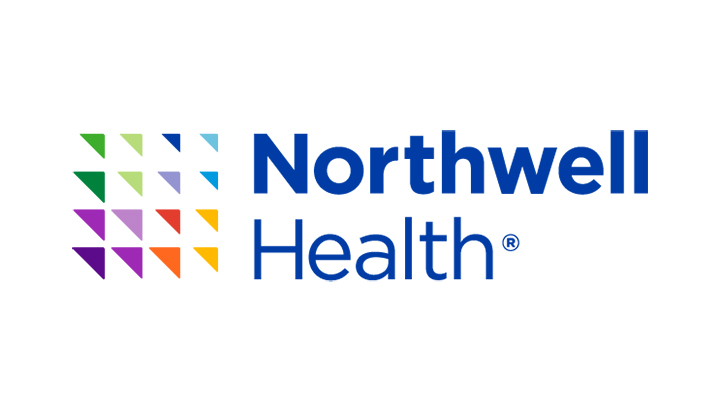Event
2022 Biotechnology Conference
Transforming & Improving the Human Condition
April 7, 2022
9:30 AM – 4:30 PM
NYIT de Seversky Mansion
Long Island, NY
Event Recording
New York Tech's 2022 Biotechnology Conference will gather recognized leaders, top global researchers, and medical professionals, plus innovators in the healthcare and biotechnology sectors. Companies and New York Tech faculty will describe their latest state-of-the art innovations and cutting-edge research transforming and improving the human condition. Government officials and investors will discuss how to tap into financial resources to fund your startup and accelerate your company’s growth. This is a must-attend event for experts, industry peers, and like-minded people to form new relationships and strengthen existing ones.
2022 Sponsors
Agenda
9:30 a.m. |
Registration/Sign-In |
10 a.m. |
Continental Breakfast and Networking |
11 a.m. |
Welcome Remarks |
11:15 a.m. |
Keynote Speaker: Chad Bouton, Vice President, Feinstein Institutes for Medical Research at Northwell Health and CEO, Neuvotion |
11:55 a.m. |
Panel I: The Startup Ecosystem: Government and Industry Resources for Helping Biotech Companies Succeed
|
12:50 – 1:20 p.m. |
Lunch and Networking |
1:25 p.m. |
New York Tech Speakers
|
2:05 p.m. |
Panel II: Executives and Founders Discuss Their Companies' Innovations
|
3 p.m. |
Networking Break (coffee/snacks) |
3:15 p.m. |
New York Tech Speakers
|
4 p.m. |
Entrepreneurship and Technology Innovation Center (ETIC): |
4:10 – 6 p.m. |
Networking Reception |
Keynote Speaker
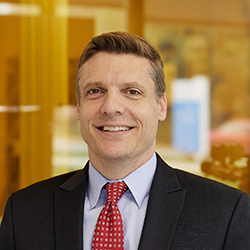
Chad Bouton, Vice President of Advanced Engineering and Director of the Neural Bypass and Brain Computer Interface Laboratory, The Feinstein Institutes for Medical Research at Northwell Health
Prior to joining the health system, Chad Bouton was a research leader at Battelle, the world’s largest nonprofit research and development (R&D) organization, and was involved in medical device R&D programs for 18 years. He developed cancer detection algorithms in the late 1990s to help surgeons pinpoint and remove tumors more effectively. Later, he developed neural decoding methods that allowed the first paralyzed person with a brain implant to move again with their own thoughts.
Read More
Bouton’s work has been featured on 60 Minutes and at TEDx, and he holds more than 70 patents worldwide. He has been awarded two R&D 100 Awards and was recognized by Congress for his work in the medical device field. He has been named Inventor of the Year and Distinguished Inventor by Battelle, and was selected by the National Academy of Engineering in 2011 to attend the Frontiers in Engineering Symposium. Bouton received his B.S. in Electrical Engineering at Iowa State University and his M.S. in Engineering Mechanics at Iowa State University with Honors.
Panelists
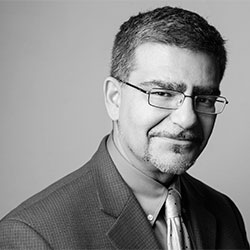
Babak Beheshti, Ph.D., Dean, NYIT College of Engineering and Computing Sciences
Babak D. Beheshti, Ph.D. is Professor and Dean of the College of Engineering and Computing Sciences (CoECS) at New York Institute of Technology.
Babak’s experience in higher education spans over 35 years, where he has served as a full-time faculty member, President of the Senate, Associate Dean, and Dean. As dean of the engineering college, Babak led the college to the introduction of its first two Ph.D. programs in computer science and engineering, two new Bachelor’s and one new Master's degree programs, in addition to leading the college through its fastest climb in national rankings: #33 Best Undergraduate Engineering Programs (National - no doctorate) – a climb of 13 places since 2020, and #191 Best Computer Science Undergraduate Programs (National - no doctorate), a new ranking in 2021– a climb of 40 places since 2020.
Read More
In line with the career-oriented mission of NYIT, Babak has led the CoECS in building a strong partnership with industry/government including NASA, Zscaler, IBM Red Hat, Xilinx, Soter Technologies, and Zebra Technologies.
Babak has served as a member of the IEEE Board of Directors (2018-19), and a member of the Board of Directors of Long Island Software & Technology Network (LISTnet). In 2022 Babak serves as a member of the Educational Activities Board and the Chair of the Continuing Education Committee. He also serves on the Board of IgniteLI – Long Island Manufacturing Consortium and is a member of the Advisory Board of The International Association of Transportation Regulators.
Babak is a recipient of the IEEE, MGA Leadership Award, IEEE Millennium Medal, the IEEE LI Section Athanasios Papoulis Outstanding Educator Award, and three IEEE Region 1 Awards, including the 2008 IEEE Northeastern Region Technical Innovation Award.
Babak received his Ph.D. in Electrical Engineering at the University of Massachusetts, Dartmouth, and his master's and bachelor's degrees in Electrical Engineering at Stony Brook University.
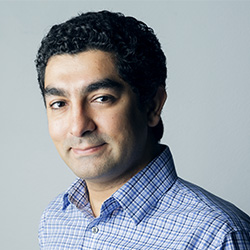
Aydin Farajidavar, Ph.D., Associate Professor of Electrical and Computer Engineering, New York Institute of Technology
Aydin Farajidavar, Ph.D., is director of the Integrated Medical Systems (IMS) Laboratory at New York Institute of Technology. Before joining New York Tech, he was a post-doctoral fellow in the School of Electrical and Computer Engineering at the Georgia Institute of Technology. He received a Ph.D. degree in Biomedical Engineering from the joint program of the University of Texas at Arlington and the University of Texas Southwestern Medical Center, Dallas in 2011. His research experience and interest include a broad range from the modeling of biological systems to the development of wireless platforms to acquire and process biological signals.
Read More
At New York Tech, Farajidavar established the IMS Lab, where he and his students conduct cutting-edge research to develop the next generation of implantable and wearable medical devices. His research program has been supported by the National Science Foundation, National Institutes of Health, Auckland Bioengineering Institute, and New York Tech. He is teaching fundamental electrical engineering courses such as electronics and digital circuits, and he has developed a novel course entitled "Implantable Medical Devices: An Embedded Systems Approach" to infuse research into educating the new generation of students on trending issues such as health and medicine. Farajidavar's research has been highlighted by various awards and news articles. His students have been consistently awarded locally, nationally, and internationally, and been hired in leading engineering firms and companies.
Farajidavar has authored more than 50 peer-reviewed journal and conference papers/abstracts and is a member of the Institute of Electrical and Electronics Engineers. He has served as the reviewer for government funding agencies, journals, and conferences. He serves on the Technical Program Committee (TPC) for MTT-10 of IEEE MTT-S and Microwave Theory and Techniques Society. He has served as organizer and TPC member for several IEEE conferences, including EMBC, BioCAS, IMBioC, RWW, IMWS, and WAMICON.
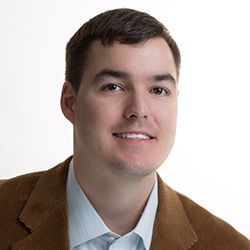
Bryan Gibb, Ph.D., Assistant Professor of Biological and Chemical Sciences, New York Institute of Technology
Bryan Gibb completed his Ph.D. at the University of Pennsylvania in the laboratory of Gregory D. Van Duyne and studied the molecular mechanisms of DNA recombination enzymes using biophysical, structural, and biochemical methods. His dissertation project focused on the site-specific DNA recombinase Cre, which is widely used as a tool in genome engineering.
Read More
Following graduate school, Gibb joined the laboratory of Eric Greene at Columbia University as a postdoctoral researcher. He developed a novel single molecule method of studying proteins that bind and function on single-stranded DNA (ssDNA). Using this technique, he was able to reveal novel mechanisms in the ssDNA binding protein RPA and Rad52. These two proteins play essential functional roles in DNA damage repair pathways. Disruption of these proteins or the associated pathways has been linked to cancer. Additional studies using this technique revealed detailed mechanistic details in the DNA recombinase Rad51.
Gibb's research at New York Tech focuses on understanding molecular mechanisms of DNA binding proteins, specifically those involved in CRISPR pathways that are widely being employed in genome engineering technologies. The long-term aim of this work is to find new tools or improve existing methodologies that can then be harnessed for biotech applications such as gene therapy.
A second line of research seeks to understand and develop bacteriophages as therapeutics. Every year, more than 2 million people acquire an infection resistant to at least one antibiotic, and more than 23,000 people die as a direct result of antibiotic-resistant infections (CDC, 2014). Given the growing inability to treat bacterial infections, novel approaches must be pursued. Bacteriophages are viruses that attack bacteria naturally, so they are an attractive tool that may be discovered from natural sources and improved by directed evolution or directed engineering approaches to be an effective therapy for bacterial infections.
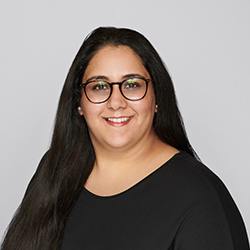
Amanjot Grewal, Assistant Vice President of Life Sciences and Healthcare Operations at New York City Economic Development Corporation (NYCEDC)
Amanjot Grewal is the Assistant Vice President of Life Sciences and Healthcare Operations at New York City Economic Development Corporation (NYCEDC). NYCEDC is a mission-driven, nonprofit organization that works with and for communities across New York City to strengthen neighborhoods and create good jobs. Amanjot - a scientist by training - has spent the past decade in the infertility and sterility space, most recently as the Associate Scientific Director of a large human donor oocyte program. Prior to entering the infertility space, Amanjot spent time in an interdisciplinary pharmaceutical MQA and Microbiology role. Amanjot enjoys being at the intersection of science and business operations and therefore has pursued graduate education to further drive her scientific and business background. This includes studying Nutritional Sciences at Cornell University, an MPH at the University of Rochester, and most recently an MBA from the University of Rochester.
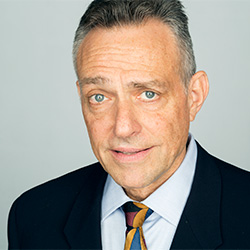
John P. Handrakis, PT, D.P.T., Ed.D., Professor of Physical Therapy, New York Institute of Technology
John Handrakis, a board-certified clinical specialist in neurologic physical therapy (NCS), specializes in teaching neurological rehabilitation, modalities, and differential diagnosis for physical therapy to D.P.T. students. In addition to teaching, Handrakis heads the Thermoregulation Research Program at the Veterans Affairs Rehabilitation Research and Development National Center for the Medical Consequences of Spinal Cord Injury at the James J. Peters VA Medical Center, where he mentors his D.P.T. students on their research projects.
Read More
Handrakis' research focuses on the regulation of core body temperature after spinal cord injury (SCI). The goals of his team's research are to identify the physiological and clinical consequences of dysfunctional thermoregulation after SCI and their impact on quality of life (QOL), and to develop interventions to improve clinical care, health, and QOL in persons with SCI.
He received his B.S. from Fordham University and a post-baccalaureate certificate degree in Physical Therapy from Columbia University. He then provided physical therapy at Rusk Institute of Rehabilitation, NYU Langone Medical Center, in the rehabilitation, outpatient, acute care, and cardiopulmonary units. During his time at NYU, he worked toward his M.S. degree in Exercise Physiology at Long Island University. Handrakis continued to provide orthopedic and neurological physical therapy care in outpatient and homecare settings. In 2005, he joined the faculty in the Department of Physical Therapy at New York Tech. He earned his Ed.D. in Applied Physiology at Teachers College, Columbia University and a D.P.T. from New York Tech. He was certified as a Neurologic Clinical Specialist (NCS) in 2016 by the American Board of Physical Therapy Specialties. He has extensive experience providing physical therapy to persons with neurological, orthopedic, and sports medicine injuries.
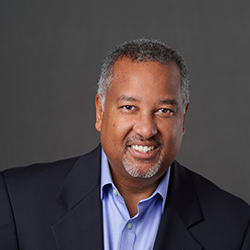
George Llado, Senior Vice President, Integration and Innovation, AstraZeneca Pharma
George Llado is responsible for AstraZeneca's Alexion Pharmaceuticals integration and rapid technology innovation acceleration cycles across AstraZeneca. Previously, Llado was the chief information officer of Alexion Pharmaceuticals, responsible for building the company’s global information technology function that enabled Alexion to serve patients and their families with rare diseases through the innovation, development, and commercialization of life-changing therapies.
Read More
A bio-pharma industry veteran with over 34 years of business, information technology and cyber-security experience, Llado and his team develop and implement innovative technology and enable data-driven insights across Alexion’s R&D, Commercial, Manufacturing Operations, and Supply Chain functions.
Prior to joining Alexion, Llado served as vice president and business line CIO for Merck and Co., where he led the large-scale merger integration of Merck/Schering-Plough across the IT and Shared Business Services organizations. He previously worked at Citibank, N.A.
Llado serves on the Board of Directors of Charles River Laboratories and the National Center for Women & Information Technology. He also serves on the Advisory Board of Sierra Ventures and Temple University’s Fox Business School. He holds a B.S. in Computer Science from New York Institute of Technology and completed the Executive Development Program at Harvard and the Wharton School of Business.
He was named to Forbes CIO Next 2021 list, which highlights top tech executives who are redefining the CIO role and driving game-changing innovation. In 2020, he was named a Global CIO of the Year finalist by the Boston CIO Leadership Association for demonstrating excellence in technology leadership.
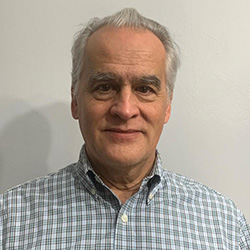
Tony Martins, MSEE, President & COO, Avery Biomedical Devices, Inc.
Tony Martins' first contribution to science relates to the artificial vision prosthesis developed since the 1970’s at the University of Utah as part of the Neural Prosthesis Program of the National Institutes of Health. Dr. William Dobelle, previous owner of Avery Biomedical, was instrumental in carrying out the experiments with volunteers to determine the feasibility of an eventual electro-cortical prosthesis. That dream only became a reality in the early 2000’s with the release of portable computers. This new technology allowed blind patients to see and walk with a small electronic system held around their waist.
Read More
Martins implemented the protocol to test and map the phosphenes in each of the 16 patients implanted with a bilateral cortical visual prosthesis. Although there was limited scientific data and no previous experience on how blind people could see with an artificial visual prosthesis, he developed a protocol to help them on how to best use the phosphenes they could see in their visual field and improve their mobility and independence. He also redesigned the neurostimulator to be significantly more compact and portable. The redesign also allowed patients to adjust specific parameters of the device which assisted them to better navigate in environments with different lighting conditions.
Martins' latest contribution to science relates to the new and future design of phrenic/diaphragm pacemakers. With several patents filed in this field, he is working on new ideas that can greatly help patients with ventilatory problems. His engineering capabilities are strengthened by clinical experience in testing the patients in the operating room during phrenic pacemaker implantation procedures and by discussing with physicians and surgeons how to advance implantable device technologies and improve patient outcomes. Other areas of work are related to temporary pacing, obstructive sleep apnea and new medical diagnostic devices that can help patients and physicians better assess the physiological status associated to the patient’s ventilatory function.
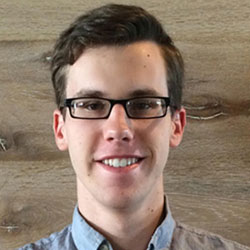
Ross McBee, Ph.D., Co-Founder and CSO, TOMTEX
Ross McBee did his Ph.D. work in the lab of Harris Wang at Columbia University, working in synthetic genomics and engineered living materials. He has published in both the arts and science literature and runs a boutique bio-art and engineering consultancy.
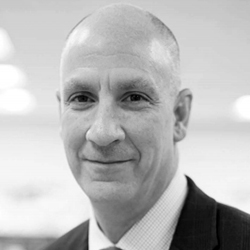
Michael Nizich, Ph.D., Director of the Entrepreneurship and Technology Innovation Center (ETIC), New York Institute of Technology
Michael Nizich is the director of the Entrepreneurship and Technology Innovation Center (ETIC) and an adjunct assistant professor of computer science at New York Institute of Technology. He has more than 25 years of professional experience in information technology in a variety of industries, including aviation, education, law enforcement, biotechnology, and cybersecurity. Nizich has held IT leadership positions in both private and publicly held companies.
Read More
With more than 10 years of college-level teaching experience, Nizich holds a Ph.D. in Information Studies from Long Island University, a master’s degree in Technology Systems Management from Stony Brook University, and a bachelor’s degree in Computer Information Systems from Dowling College.
Through ETIC programs, Nizich regularly connects both domestic and international students with internships and full-time positions in cybersecurity. He also directs New York Tech’s Center of Academic Excellence for Cybersecurity Education, designated by the U.S. Department of Homeland Security and the National Security Agency, and serves as a member of the CTEA committee for cybersecurity for Suffolk County Community College.
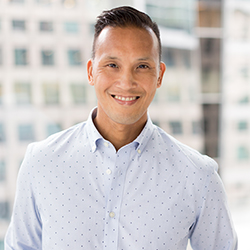
RJ Panzo, Corporate Managing Director, Lab and Facility Planning, T3
RJ Panzo is Corporate Managing Director in Savills Boston office, and provides life sciences companies with comprehensive lab/facility planning and solutions. He has built and managed a specialized platform that’s designed to help life sciences companies with the end-to-end process of starting and/or expanding their laboratories. This includes lab programming, project management support for laboratory build-outs, tenant improvements, relocations, and operational establishment.
Read More
RJ joined Savills in 2021 following the company’s partnership with T3 Advisors, the leading real estate workplace solutions advisor to life sciences and technology companies, where he served as a Principal. He brings over 20 years of experience working in various life science roles, including laboratory research, project management and operations. RJ served as the Site Operations Manager at Merck, where he managed the activities of all contracted and internal support partners needed to maintain operations in both the office and lab. As a Global Operations Manager at OvaScience, RJ built and established small-scale GMP manufacturing labs in five different countries.
RJ holds his Six Sigma Yellow Belt Certification and advocates for using Six Sigma tools and methodologies within organizations to optimize performance. He also holds a certification in HVAC Systems and Lab Design from the Eagleson Institute.

Sonsy Rajan, Director and Head of Intellectual Property Affairs at FUJIFILM Cellular Dynamics
In her role, Sonsy Rajan leads and protects IP and innovations for cellular therapies, research use, and facilities CDMO activities.
Read More
Rajan has been part of the biotech industry since 2003 as a scientist and then as a lawyer practicing IP law. In her career, she has developed and protected robust IP portfolios for multiple therapeutic products in central nervous disorders, infectious diseases, cardiovascular diseases, Immuno-oncology, and dermatology. In addition, Rajan has contributed to the acquisition of IP assets, development, licensures, as well as IP divestitures, realizing a profit of about $2 billion. Her patent practice through the years spanned more than 40 jurisdictions, more than 15 commercially available drugs in various therapeutic areas, many pipeline projects covering multiple regulatory bodies, and multiple due diligence activities, accretive to more than $5 billion.

Eva Shih, Managing Director, T3
As an advisor in T3’s NYC office, Eva Shih has the opportunity to guide companies of all different stages through their journey of finding optimal workspace. That journey consists of making sure to listen closely to clients, understanding their priorities and constraints, and all along being their trusted advocate.
Read More
Before joining T3, Shih was the VP/Associate Broker at commercial real estate firm OLC (acquired by T3 in 2017). Highly focused on the NYC office leasing market, she gained experience representing startups of various sizes with unique priorities.
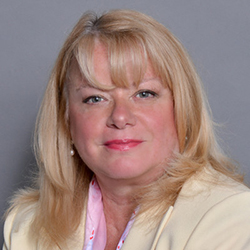
Carmella L. Stephens, Ph.D., Partner, Carter, DeLuca & Farrell LLP
Carmella L. Stephens, a patent attorney with over 25 years experience, counsels a wide range of clients including biotechnology and pharmaceutical corporations as well as academic institutions on issues relating to biotech and pharmaceutical patents. Her experience includes development and management of complex U.S. and foreign patent portfolios based on assessment of the client’s business interests. The majority of her patent practice focuses on patent prosecution, IP due diligence, and preparation of opinions relating to patent eligibility, validity, infringement, and freedom-to-operate.
Read More
Stephens’ patent practice covers an array of different life science technologies including those relating to endonuclease based genome editing systems; immunobiology; diagnostic and prognostic tests based on gene expression profiles; viral based expression systems for use in gene therapy; and stem cell-based therapies, to name a few.
Prior to pursuing a legal career, Stephens received her Ph.D. from SUNY Stony Brook after the completion of her thesis research at Cold Spring Harbor Laboratory followed by a post-doctoral fellowship conducted at Memorial Sloan Kettering Cancer Center. Her technical background in the life sciences provides her with the ability to successfully interface with scientists to maximize protection of their intellectual property.
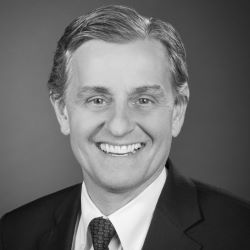
Kevin Tracey, M.D., President, Feinstein Institutes for Medical Research at Northwell Health
Kevin Tracey is a leader in the study of the molecular basis of inflammation and bioelectronic medicine. He and his colleagues identified the neural mechanism for controlling the immunological responses to infection and injury, and developed devices to replace anti-inflammatory drugs in clinical trials of rheumatoid arthritis, a new field termed bioelectronic medicine. The recipient of numerous awards and honors, including an honorary degree from the Karolinska Institute, Tracey is a fellow in the American Association for the Advancement of Science, and a member of the American Society for Clinical Investigation and the Association of American Physicians. He is co-founder and councilor of the Global Sepsis Alliance, a non-profit organization supporting the efforts of over 1 million caregivers in more than 70 countries.
Read More
Tracey graduated summa cum laude from Boston College, majoring in chemistry, and received his M.D. from Boston University. He trained in neurosurgery at the New York Hospital/Cornell University Medical Center, and was guest investigator at The Rockefeller University. Since 1992, he has directed the Laboratory of Biomedical Science in Manhasset, N.Y., where in 2005 he was appointed president of the Feinstein Institutes. Tracey delivers lectures nationally and internationally on inflammation, sepsis, the neuroscience of immunity, and bioelectronic medicine. He is the author of Fatal Sequence (Dana Press) and more than 360 scientific papers.
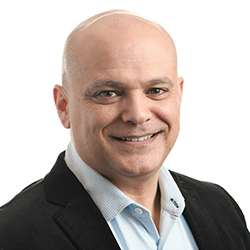
Robert W. Wild Jr., COO, Intelligent Product Solutions
Bob has nearly 30 years of engineering and design experience. He began his career at Symbol Technologies, where he participated and led the development of several flexible automation systems with machine vision as part of their Advanced Manufacturing Group. In addition, Bob was part of Symbol’s Advanced Development/R&D team, where he was part of a 6-person team developing one of the first Bluetooth solutions on custom ASIC.
Read More
Over the next ten years, Bob participated in the emerging 3G cellular space at Layer One and then continued working on packet radio designs at BAE Systems. At BAE, he led the software engineering department with 60 engineers and eventually took the lead for all the engineering content for the development of Mission Computing and Antenna Systems Division, a $300M business. In addition, Bob was very fortunate to be selected for BAE’s Leadership and Enhanced Development Program, where 20 employees are selected from over 48,000 to participate in an intensive year-long training program with exposure to each business location and leadership team in the U.S. and the U.K.
For the last 11 years, Bob has contributed to the growth of and development of Intelligent Product Solutions. Personally involved with hundreds of projects during this time, Bob has participated and led the product development of automotive, industrial, commercial, defense and aerospace, as well as medical devices for a plethora of outstanding clients.
Bob received a Bachelor of Science in Electrical Engineering focusing on Control Systems from SUNY Stony Brook, a Master of Science in Electrical Engineering from Polytechnic Institute of NYU, and an MBA from SUNY Stony Brook.
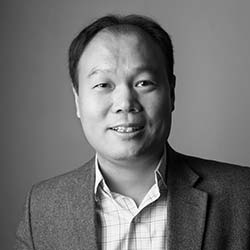
Shenglong Zhang, Ph.D., Associate Professor of Biological and Chemical Sciences at New York Institute of Technology
Shenglong Zhang received his doctorate in organic chemistry from Columbia University and his post-doctoral training in Harvard University. He was among the first pioneers in developing the next-generation sequencing (NGS) technologies and spearheaded the development of an LC-MS-based direct RNA sequencing.
Read More
The new RNA sequencing technology is completely independent of base complementarity and provides a general solution towards de novo RNA sequencing and modification analysis. Its application in RNA biology helps to answer the longstanding questions of: 1) how aberrant modifications in cellular RNA correlate with human diseases such as cancers, diabetes, and neurodegenerative disorders; 2) how RNA modification patterns and levels change in response to cellular environments and environmental stress. His studies also provide new perspectives into RNA epigenetic regulations and facilitate the identification of new RNA biomarkers and targets for drug discovery and personalized medicine.


